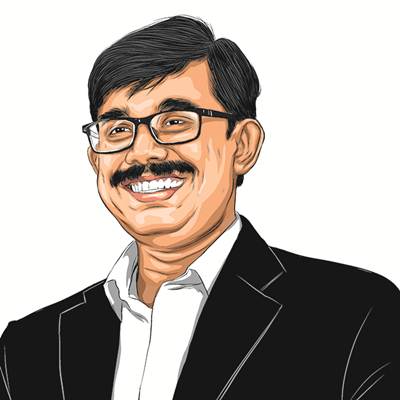Opinion Lessons from the Ranveer Allahbadia row
These issues need hard conversations between parents and children. We need to ensure that the next generation of the audience knows how to dismiss the next crudity.
 Ranveer Allahbadia with Samay Raina at the sets of India's Got Latent. (Source: Instagram/@ranveerallahbadia)
Ranveer Allahbadia with Samay Raina at the sets of India's Got Latent. (Source: Instagram/@ranveerallahbadia) Sex. Violence. Disturbing scenes. Language. Graphic sequences. Parental advisory. Today, every episode on a streaming platform comes with labels like these on the top left corner of the screen. This, after an elaborate disclaimer that effectively, and farcically, washes its hands of everything you are about to watch. If you find anything offensive or demeaning, nothing is intended, it’s all in your head. All this is under the rubric of freedom of speech. Then come Ranveer Allahbadia and his band of brothers. The same person has interviewed leading politicians across all parties as well as celebrities — clearly, everyone wants to be on his show for the size of his audience. So he, in an attempt to be funny, makes a comment on children, parents and sex, perhaps thinking that will sustain the millions who follow him — or add a couple million more.
In a discourse where everything is divisive, the reaction is on predictable lines: Those who support him say he is pushing the boundaries; if you don’t like it, switch off, go to the next YouTube channel. There are many who say, “What else did you expect?” Then, there are many who say these men have wrecked the foundations of a family’s morality.
Lost in all this is one key fact. Our ability to navigate our way through mounds of garbage. In our cities, we know how to do it. Despite significant gains made by Swachh Bharat, in every city, every small town, there is unclaimed garbage on the side of the road; there are plastic bags and polypacks at every tourist destination. We hold our noses, walk past it, drive around it, look the other way, get out as fast as possible. Can we do the same with the garbage on the information highway? On the trash that pops up in our Instagram feeds?
It is politically incorrect to call content trash but the fact is, Allahbadia’s alleged joke was neither funny — at least not to this writer — nor provocative. Several comedians with much stronger and sharper humour have paid a cost with either FIRs or bans or cancellations. What is clear is that the team at India’s Got Latent believes that you need to be more crass since that’s what “works”. The contempt for their audience is clear.
They also know that a joke told a second time isn’t funny, so the only way to get those views coming is by falling on the oldest tropes in the business. Perhaps they see a model in many of the new American stand-up comedians with their own shows on Netflix or Amazon who talk about orgasms, sexuality, their own sexual experiences and even their anatomies with a remarkable ease — and bring the house down. When almost nothing shocks anymore, what do you need to make people squirm in their seats, laugh nervously? That’s what people pay for.
The Oscar season is upon us but remember how three years ago, Will Smith, the distinguished actor, walked onto the stage and slapped comedian Chris Rock because, apparently, he didn’t like how he talked about his wife, Jada Pinkett Smith. There were the usual noises made about behaviour in public and celebrity tantrums but it faded away into the next shocking reel.
Mahatma Gandhi’s three monkeys need to be recalled today. During Covid and when pollution levels are high, we use masks to keep the virus and particulate matter out. Our smartphones are protected end to end by antivirus software. What are the masks that we need for our children as they navigate the trash-littered information highway? One of the greatest theorists of communication, Elihu Katz, underlined the key paradox of mass media: Should it lead or follow, mirror or mould society? Communication, he argued, has been employed both as an instrument of social change and a reinforcing force to maintain the status quo.
Undoubtedly, the information highway has limitless opportunities and possibilities that will help our children realise their full potential, grapple with contradictions and truths. How to equip them with masks and the ability to hold their noses, walk around the trash, is what we need to work on. We have to tell them that, as Javed Akhtar says, the use of abuse — he likens this to a chilli in food — to shock shows that you have run out of imaginative powers to use language.
One answer lies in getting them young. Right from kindergarten, at school, and at home, we need to help our children switch off the phones. We need to equip them with tools to navigate the information highway knowing very well that while it runs past meadows and lakes and rivers and beautiful city squares, it also forks into crudity and hate. Children must witness their parents’ conduct and choices as well. Our children carry testimonies of ethical memories from us, from the way we live and the way we talk, the level of importance we give to trust, care, responsibility and respect. In a society where brand is everything, can we brand respect, ethics as a key element of our profile? These issues need hard conversations between parents and children, between parents and teachers, children and teachers. We need to ensure that the next generation of the audience knows how to dismiss the next crudity.
Nilay is the author of Being Good, Aaiye, Insaan Banen and Ethikos. He teaches and trains courses on ethics, values and behaviour






